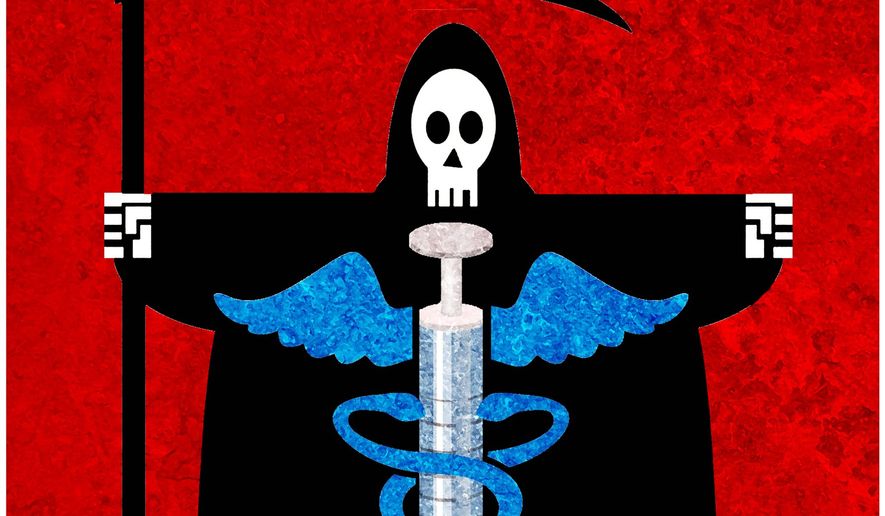OPINION:
Assisted suicide makes for bad law and bad medicine. It is dangerous public policy that negatively impacts everyone and profoundly changes medicine’s role in society. Performing assisted suicides damages the physician-patient relationship and violates our calling to heal.
Many medical groups globally and in the United States reject assisted suicide. The World Medical Association (WMA), for example, recently announced its continuing firm opposition, writing “utmost respect has to be maintained for human life.” The WMA reached this conclusion after holding consultative conferences around the world, and states that the WMA position “is in accord with the views of most physicians worldwide.”
Domestically, groups including the American Medical Association, the National Hospice and Palliative Care Association, and the American College of Physicians, all oppose assisted suicide. The American Medical Association concisely states that “Physician-assisted suicide is fundamentally incompatible with the physician’s role as healer, would be difficult or impossible to control, and would pose serious societal risks.”
As part of my training, like many other physicians, I took the Hippocratic Oath seriously, promising “to do no harm.” Assisting a patient in procuring lethal drugs so he or she can commit suicide assuredly goes against that promise. Doctors should always offer healing and comfort to the sick, not a prescription for a lethal dose of barbiturates. Physicians who are willing to be an agent in their patients’ demise will not be trusted, and everyone will lose out.
Assisted-suicide laws require a physician’s prognosis of six months or less to live, but it isn’t realistic or fair to expect doctors to accurately predict a person’s lifespan when prognosticating is one of the most difficult tasks we face as physicians. Unless patients are within days of dying, it’s nearly impossible to provide an accurate prognosis for any particular individual.
In Oregon, where assisted suicide was first legalized, patients have lived years after receiving but not using a lethal prescription. Tragically, we will never know how many who have prematurely ended their own lives based on a doctor’s educated best guess could have gone on to live much longer.
These policies are impossible to control because the supposed safeguards are ineffective. There is generally no requirement for psychiatric evaluation in these laws and one study showed that, in Oregon, some patients who were depressed received lethal drugs. There is no requirement for an impartial witness to observe whether the patient’s ingestion of the lethal drugs was in fact voluntary.
And medical records are also falsified because assisted suicide is not listed as the cause of death on the death certificate, but rather as an “underlying condition.” For all of these reasons and many more, assisted suicide has proven to be a practice for which there is little regulation or accountability.
Assisted suicide also allows physicians to discriminate against some of their most vulnerable patients. Ordinarily, if someone indicates that they want or intend to commit suicide, health professionals respond with crisis intervention. But not if the person is diagnosed with a terminal illness in a place where assisted suicide is legal. In these states, certain individuals suffering from suicidal ideation no longer receive the protection of suicide prevention services and can be encouraged toward death.
Considering the many dangers inherent with assisted suicide, it is not surprising that most physicians in the United States have not been eager to participate, even when the practice is legal. In 2017, Washington, D.C., legalized assisted suicide and required that doctors who wanted to perform assisted suicides register with the city. A year after the passage of the law, only two out of more than 11,000 practicing doctors in the area had registered for the program.
Most of us go into medicine because we want to save lives and provide appropriate, compassionate care to the sick and dying. Assisted suicide does not accomplish this; instead, it puts a great many who deserve our protection at risk for deadly harm.
• Frederick J. White, a physician, is a Louisiana delegate to the American Medical Association and is an associate member of the World Medical Association.




Please read our comment policy before commenting.